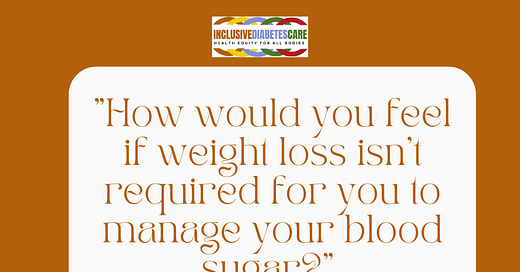Does Weight Stigma Result in a Cycle of Self-harm for People with Diabetes?
7 Research Findings That Might Surprise You!
Understanding How Weight Stigma Results in a Cycle of Self-harm for People with Diabetes
Weight stigma is positively associated with diabetes, and research [listed below] has detailed that it cannot motivate individuals to lose weight. It increases a person's risk for adverse health conditions. The experience of weight stigma causes a decrease in self-care. The impact can range from an increase in eating disturbances, depressive symptoms, anxiety, and body image dissatisfaction to a lowering the self-esteem in overweight adults with a BMI >30, regardless of the measure of weight stigma.
The impact of weight stigma isn’t a small thing.
Understanding how stigma associated with diabetes reinforces other oppressive narratives requires healthcare professionals to understand some key terms. The first is weight bias, internalized weight bias, outcomes, self-stigma, and structural stigma.
Weight bias is thoughts that exist about a person's weight. Weight bias can be internalized, and when it is, your client likely has these thoughts about their weight. Many clients talk about weight loss or ask about it when that is the expected 'script' that a higher-weight person must engage in to receive care. For example, an individual might say, "I have diabetes, so I have to lose weight," which is likely an expression of internalized weight bias and diabetes stigma rather than truly about desired weight loss.
What were the red flags? When a client jumps to a solution, such as saying, "So I have to lose weight," without exploring the options. In this example, it is often a way to signal to the healthcare provider that they are sensitive about their weight and already feel a sense of self-blame.
When a client experiences weight bias from a healthcare provider, it becomes weight stigma. The outcome of a stigmatizing healthcare visit often leads to disordered eating, decreased provider trust, resistance to seeking medical care, yo-yo dieting, and decreased self-care. Year after year, these experiences build - leading to diabetes burnout, diabetes distress, and disordered eating. The complex nature of oppression makes it hard for clients to verbalize why they feel ineffective, which can further energize self-blame, reinforcing internalized weight stigma.
It is worth pointing out that this cycle of bias and stigma erodes the client/provider relationship and contributes to clinical inertia and poor outcomes, even if the patient does everything "right."
When Agreement Causes Harm
Many healthcare professionals feel they need help. They have been trained to provide the client's desired service, so if the client says, "I need to lose weight," isn't it the service that should be provided? While it is easy to say yes, in healthcare, it is helpful to remember we have taken a vow not to harm. Weight stigma cannot motivate individuals to lose weight. It increases a person's risk for adverse health conditions. When we talk about intentional weight loss, we can't know if it is stigmatizing; therefore, we need to meet our professional ethics. Before you react - pause and remember how you have been trained to say no. For example, when a client asks for antibiotics or pain management, you have been trained to pause and get more curious about why these are being requested. The same is true for weight. "Tell me more about why you want to lose weight?" "What ideas or changes are you considering trying?" "How would you feel if weight loss isn't required for you to manage your blood sugar?"
"How would you feel if weight loss isn't required for you to manage your blood sugar?"
When healthcare professionals can see the impact of structural stigma, they are more likely to identify stigmatizing policies. This is because weight-inclusive training overlaps with identifying, treating, and preventing disordered eating, DEI (Diversity, Equity, and Inclusion), and other anti-racism work.
Diabetes Care Professionals who advocate for inclusive standards of care are working to dismantle all forms of oppression and reduce barriers to diabetes care.
Additional Key Findings
People who felt pressured by healthcare providers or family members to manage their blood glucose levels were likelier to experience shame.
Even in weight-related health campaigns, weight stigma is pervasive.
Further, weight stigma and prejudice toward clients who are overweight or obese are common among healthcare professionals, thus signifying a significant barrier to healthcare utilization.
The following articles can deepen your understanding of these complex topics:
Wu YK, Berry DC. Impact of weight stigma on physiological and psychological health outcomes for overweight and obese adults: A systematic review. J Adv Nurs. 2018;74:1030–1042 https://doi.org/10.1111/jan.13511.
Emmer, C, Bosnjak, M, Mata, J. The association between weight stigma and mental health: A meta-analysis. Obesity Reviews. 2020; 21:e12935. https://doi.org/10.1111/obr.12935.
Alimoradi Z, Golboni F, Griffiths MD, Broström A, Lin CY, Pakpour AH. Weight-related stigma and psychological distress: A systematic review and meta-analysis. Clin Nutr. 2019;39:2001–2013. https://doi.org/10.1016/j.clnu.2019.10.016.
Rebecca M Puhl, Ph.D., Leah M Lessard, Ph.D., Nicole Larson, Ph.D., MPH, RDN, Marla E Eisenberg, ScD, MPH, Dianne Neumark-Stzainer, Ph.D., MPH, Weight Stigma as a Predictor of Distress and Maladaptive Eating Behaviors During COVID-19: Longitudinal Findings From the EAT Study, Annals of Behavioral Medicine, Volume 54, Issue 10, October 2020, Pages 738–746, https://doi.org/10.1093/abm/kaaa077.
Ellen Solomon, Venise J. Salcedo, Megan K. Reed, Alison Brecher, Elizabeth M. Armstrong, Kristin L. Rising; "I'm Going to Be Good to Me": Exploring the Role of Shame and Guilt in Patients With Type 2 Diabetes. Diabetes Spectr 15 May 2022; 35 (2): 216–222. https://doi.org/10.2337/ds21-0062.
Gretchen Paitt; 848-P: Understanding Diabetes-Related Stigma in African-American Churches: The Blame and Shame Game. Diabetes 1 June 2019; 68 (Supplement_1): 848–P. https://doi.org/10.2337/db19-848-P.
Inagaki S, Matsuda T, Muramae N, et al. Diabetes-related shame among people with type 2 diabetes: an internet-based cross-sectional study
BMJ Open Diabetes Research and Care 2022;10:e003001. doi: 10.1136/bmjdrc-2022-003001





